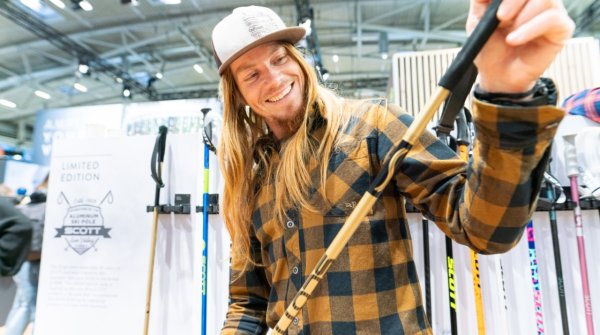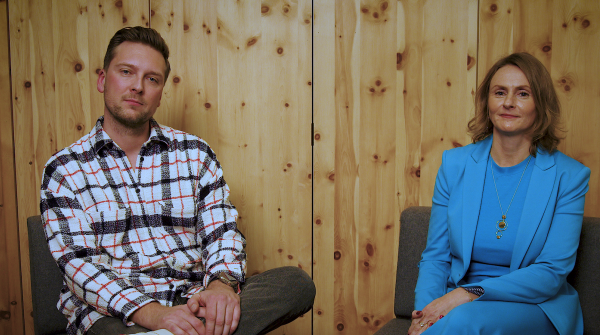
Kasper Rorsted arrives in a gray mottled hoodie from Adidas, Björn Gulden in a blue Puma training jacket.e, the two CEOs wear their brand's sneakers and blue jeans. If it weren't for the decisive difference, the respective logos on the lapels, you could almost say that the two bosses of Germany's largest sporting goods manufacturers appear in a partner look at this historic meeting in the Nuremberg TH, the first joint public appearance of the bosses of these two once hostile global companies from Herzogenaurach in Franconia.
With their symbolic appearance at the NN Talk of the "Nürnberger Nachrichten", the Dane Kasper Rorsted and the Norwegian Björn Gulden also want to make clear that it is over, the time of bitter rivalry between the neighbors, on which the respective company histories have been based since the breakup of the hostile brothers and company founders Adi and Rudi Dassler. Kasper Rorsted, CEO at Adidas since 2016, and Björn Gulden, CEO at Puma since 2013, are literally getting cozy. They hug and laugh, they applaud each other's pointed statements - and at one point the bosses of Adidas and Puma even high-five each other at this historic meeting in the auditorium of Nuremberg University of Applied Sciences.
All just for show? It doesn't seem that way. And yet there are also - not only in terms of company size and sales - clear differences between Kasper Rorsted and Björn Gulden on the current issues in the sports business. ISPO.com has been listening.
Enmity is no longer an issue. Kasper Rorsted even claims to have identified "absolutely zero rivalry" between competitors Adidas and Puma. "That doesn't exist in my world," says the Adidas boss: "I hope that customersbuy our products- but if they don't, they should buy from Puma rather than somewhere else." You would hardly have heard such a sentence from Adi Dassler - nor from his brother Rudolf the replica given here by Puma boss Gulden: "We are competitors, sure. We would like to be better than them. But we have a very good relationship. If someone is to succeed besides us: then Adi! We really believe that."
Nice words that fit the picture of rapprochement - and yet do not depict the business, in which there are many a dispute over trademark and patent rights in court, for example the sole dispute in 2016? "That's always the case when two big companies are in competition. It's part of day-to-day business, but it doesn't put a strain on the climate," says Kasper Rorsted. And laughs when Björn Gulden adds, "Our legal departments have to be kept busy with something."
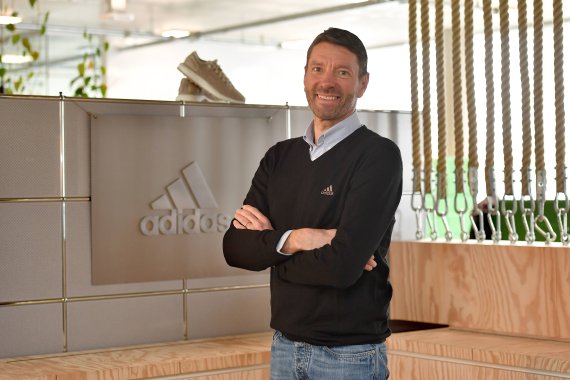
There's a lot of construction going on in Herzogenaurach right now, and Adidas and Puma are investing not only in legs, but also in bricks - at the company headquarters. A clear commitment to the Herzogenaurach site, then, which both also back up with statements. "Anyone who even thinks" about moving the company headquarters from the small Franconian town to a metropolis, Munich or even London, "is making a big mistake," says Kasper Rorsted about Adidas: "We live from our history. That makes us proud. People feel comfortable here. We belong to Herzo," which is what they call Herzogenaurach.
Björn Gulden applauds and says: "There was once this consideration of going to Munich in the mid-90s. It's good that we stayed in Herzo, this is where our roots are."
The two companies from Herzogenaurach are global enterprises; Adidas generates 95 percent of its sales outside Germany. And of course they registered how Nike, the world market leader, was criticized with its tax-saving models when the "Paradise Papers" were published in Germany.
"It wasn't a surprise to us, we know what they're doing, it's in the annual reports," says Adidas CEO Rorsted, rather criticizing lawmakers, "If the government wants to change something, it should change the laws. Governments have to pass laws and ensure that they are complied with. We are all global companies and have to be competitive worldwide."
Globalization and digitization have also completelychangedthe sporting goods market in recent years.For Adidas and Puma, Asia has long been the market of the futureand already the present: "We are growing disproportionately in China and India, " says Puma CEO BjörnGulden.
Kasper Rorsted concurs: "Our business is exploding online: We make 1.5 billion euros in online sales worldwide. In China, we did 80 to 100 million euros in sales on Singles Day alone - in one day!" And then he holds up his smartphone and says, "The primary shopping device is a mobile device. In the future, delivery via mobile devices will reach the customer the same day, in a few hours."
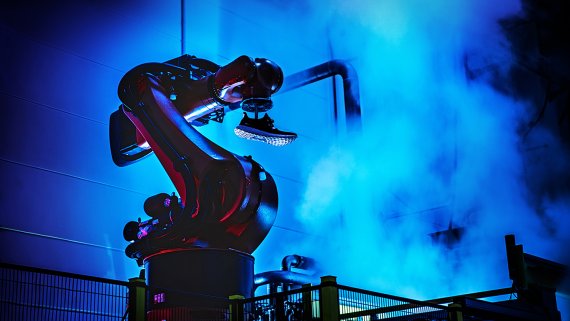
"Forver faster" is the claim of Puma, and at Adidas this will also apply to production in the future. Keyword Speedfactory, keyword sports shoes from the 3D printer. Adidas has built a fully automated factory in Ansbach, Germany, where it will be possible to create individual, customized shoes for each customer, "for a corresponding surcharge," says Kasper Rorsted, "300 to 350 euros could then be the price of such individual running shoes created after a foot scan. Rorsted recognizes an "enormous capability in digital manufacturing processes in Germany." But he also says, "Shoe production will not return to Germany." The know-how of the employees in Asia, where all brands operate the majority of their production, is significantly more profiled than in Europe, he says.
Fast factory? At Puma, they're not there yet. And a location like Ansbach would not be an option, according to Björn Gulden: "If we build a speed factory, then it would rather be in China." Same argument: "Germany and Europe are far less competent in shoe manufacturing."
What are the actual products that brands like Adidas and Puma rely on in the global market today? Are they still a sports brand, or are they already and above all into fashion? Kasper Rorsted on Adidas: "We are a sports company. Period. Out." And, "We want to be the best sports company in the world."
But haven't lifestyle products long dominated the sports sector? "Sports is the focus, but sports and fashion sell together," says Puma CEO Björn Gulden. "The influence of fashion on sports is very big." And he brings up two examples from his globalized world: "Every American has four pairs of running shoes on average - but most Yanks don't run at all." And: "In China, more and more women are doing sports. And they also want to look good doing it."
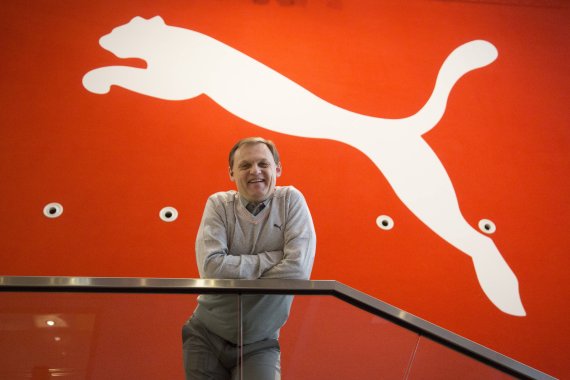
Adidas and Puma reach their target customers primarily through influencers and brand ambassadors. At Puma, a major advertiser has just retired from active sports: Olympic champion Usan Bolt (Björn Gulden: "If he had been a basketball player and not a runner, he would have been the highest-paid athlete in the world. His problem is: spikes haven't made their way into fashion yet") has ended his career. For Puma, this is more of an opportunity than a malus, thinks Björn Gulden: "Usain Bolt will stay with us his whole life. And he'll tend to have more time for us now, he'll become more visible." A lifestyle collection, for example, could come into question.
Bolt will "always be part of the Puma family," says Gulden, "just like Lothar Matthäus and Boris Becker."
The Norwegian Gulden criticizes the fact that these two exceptional athletes, Matthäus and Becker, would have a hard time in the German public after their careers: "Don't tear down your heroes. Don't destroy them! They're super guys, super people. We appreciate both of them very much." So much so that in the current case of Boris Becker, whose debt problems are being exploited by the media not only in England, the Puma boss makes a confession: "If Boris asked me, we would help. We can't pay all his debts in full, but he would get support from Puma. He is part of the Puma family. He can call me."
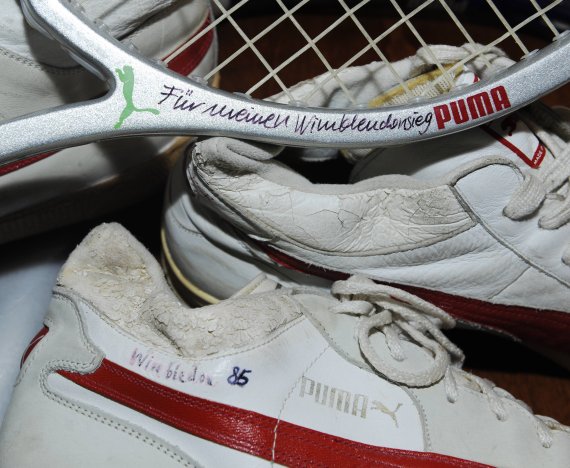
Will Adidas make the same commitment to Franz Beckenbauer that Puma CEO Gulden made in the Boris Becker case? "Franz Beckenbauer will always be part of our family," says CEO Kasper Rorsted about the soccer luminary who has come under pressure as a result of the tax and World Cup affair. The fact that Beckenbauer has not been seen in Herzogenaurach for a long time and is not currently being used for any advertising campaign would be more likely due to his state of health.
Kasper Rorsted, at any rate, is not distancing himself publicly: "We owe him so much, he made the brand known globally. The long association counts. Franz Beckenbauer was always loyal to us, and we also owe him loyalty. Whether he made mistakes, and if so, what they were, is for others to judge."
Adidas boss Kasper Rorsted applauded when Puma colleague Björn Gulden offered help for Boris Becker. And Gulden applauded when Adidas colleague Rorsted expressed his loyalty to Franz Beckenbauer. These scenes were not the only ones to show: Adidas and Puma have rarely been this close.
So the bosses of Adidas and Puma have everything in common? Well, in their private lives at least, they maintain certain differences: Björn Gulden lives in a hotel in Herzogenaurach, while his family still lives in Norway. Kasper Rorsted has an apartment at the company headquarters - and a house on Lake Starnberg, where his family lives. The Adidas CEO treats himself to 35 ski days a year, "from November to May, every other weekend," and he bikes into work every morning at 5:30 a.m. - to get in an hour of exercise: "At 5:50 a.m., I'm in the gym, every morning."
"That's when I come out of the pub," jokes Björn Gulden, the former professional soccer player. "Okay, I'll be at the gym at 6:15."
Adidas head Kasper Rorsted applauded when his Puma colleague, Björn Gulden, offered help for Boris Becker. And Gulden clapped when Rorsted professed his loyalty to Franz Beckenbauer. These scenes weren’t the only ones that showed that Adidas and Puma have rarely been so close.
More similarities between the bosses of Adidas and Puma? Well, in private at least, they show certain differences. Björn Gulden lives in a hotel in Herzogenaurach, while his family remains in Norway. Kasper Rorsted has an apartment at the company headquarters – and a house on Lake Starnberg, where his family lives. The Adidas CEO treats himself to 35 days of skiing per year, “from November to May, every other weekend,” and he bikes to work early every morning at 5:30 – in order to then take an hour of exercise: “I’m at the gym at 5:50, every morning.”
“That’s when I’m leaving the bar,” jokes Björn Gulden, the former professional soccer player. “Okay, I’m at the gym at 6:15.”
- Awards
- Mountain sports
- Bike
- Fitness
- Health
- ISPO Munich
- Running
- Brands
- Sustainability
- Olympia
- OutDoor
- Promotion
- Sports Business
- Textrends
- Triathlon
- Water sports
- Winter sports
- eSports
- SportsTech
- OutDoor by ISPO
- Heroes
- Transformation
- Sport Fashion
- Urban Culture
- Challenges of a CEO
- Trade fairs
- Sports
- Find the Balance
- Product reviews
- Newsletter Exclusive Area
- Magazine

